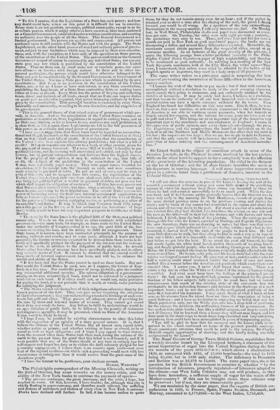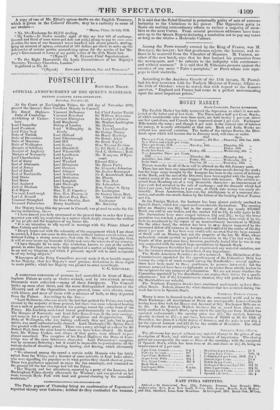Sir Lionel Smith is the object of scurrilous attack in
some of the
Jamaica journals, in the Planters' interest, received by the last packet; while on the other hand he appears to IttIVC completely won the affection of the great body of the labouring population. He sailed in the Serpent on the 1st of October ; and the St. .fago Gazette describes the scene at his departure in moving language. A still more impressive account is given in a private letter from a gentleman of Jamaica, inserted in the Colonial Gazelle.
"I will not allow the occasion to pass of Sir Loners leaving the seat of his eventful government without giving you some little detail of the gratifying' manner in which his departure from these shores was lamented by tho,e whom he had endeavoured successfully to do so much good. When tile day was fixed, mol it lia.1 hecome pretty generally known that the General %vas to leave very early in the morning for Port Henderson, crowds of people from the more distant parishes came in on the previens evening and during the night ; and by break of day. masses had assemided in the square and along the streets, and all tire way down to the port. For about a quarter of' a milediefore you reached this, they had divided into t %co lines, the women on one side and the men ou the other—alL in their holy:lay dresses, and with flowers mid bows, flesh:oiled, I think, fvoin the bark of the plantain. When the carriage passed through this line with Sir Lionel, escorted ty Darling, and Captain Hip:ills...in, the nele Secretary, there was no shouting or noise ; but there was that rove- renee and respect which indicated the ihoper feeling within ; and when he dis- mounted, it showed itself by the rush of the peopie to touch him. He had some little distance to walk, but they clung to him in such a svay as to impale bins not a little; and it is impossible to describe the scene that fillhowed aliti just liellwe we gut into the boat. Tb.,re stood the good. old General, his lino tall manlv figure, his white head bared, amidst thousands of weeping, kneel- ing, and deeply -grateful people, who were My-eking blessings on hirn and his. Before Sir Lionel reached the boat, he became evidently deeply affected with the scene around him. I he became ashy pale, and his knees trembled with the con- vulsive workings of inwind feeling. lie gave way at last ; and the soldier who for half a century could stand unmoved einid,:t the conflict of men and arms, melted like a woman befine the devotion utah gratitude which everywhere sur- rounded. him. I assere you, I never shall forget that scene. There wea scarce a dry eve in either the White or Celoured of the mass of turnout! twines rwseeolded. And what must have been Pie feelings of the principal peisins there ? He had seen his long-eherislied, generous aspirations for the general freedom of his fellow subjects fully realized: he roust have had an inwarri consciousness that much of the existing state of the new-made free was attributable to his unbending liminess and dceieion in the discharge of a most importent trust ; and he saw the result, itt the undisguised eTatittele of the nitue that lamented his departure. I may epeate freely (If what I think of 1Ma note, as his absence from the island fives me from the imputation of being, a court flatterer : and I have 110 hesitation in expressing my belief, that too; the Black popitletion only, but the White filso, owe hini a deep debt of gratitude, for the energy, the deecision, the mall:idling firmness of Ids government. Ile has spoken Solite plain truths ; line, like a skilful surgeon, cut deep to reech the seat of disease; but he has read them a lesson they will not soon forget, end has done more in his short reign to break down long-cherished and long-subsisting prejudices, than could have beets accomplished in years of temporizing policy. 4, You will be glail to hear that his successor and Sir Lionel while he re • mined in the island continued on terms of' the greenest possible courtesy. Every considerate attention that could be paid to the veteran, Sir Charles. Metcalfe sought opportunities of showing; and this kindly feeling was fully reciprocated by Sir Lionel."
The Royal Gazette of George Town, British Guiana, republishes froiw a weekly circular issued by the Liverpool brokers, a statement of the actual importation of sugar 'into the United Kingdom during the first six months of the years 1835-6-7-8-9 ; which shows a diminution in 1839, as compared wills 1635, of 25,000 hogsheads—the total in 1S3Zi being 65,430, but in 1839 only 40,920. The deficiency in Demerara. and Berbice was as 22,270 to 15,000. The same paper says, the stain question for the British Government to consider is, whether " by the. introduction of labourers properly regulated—of labourers adapted to the climate—our West India Colonies may not still produce, as they have done heretofore, a sufficient supply of sugar for the wants of the Mother-country? If this can be brought about, these colonies may be preserved ; but if not, they are irrecoverably gone."
We are reminded by the same paper, that the exports of British Ula- nitfactures in 1835, to France, Spain, Prussia Sweden, Denmark„ and. Norway, amounted to 2,173,2561.—to the West Indies, 3,78403. A Copy of one of Mr..Elliot's opium-draftS on the English Treasury, 'which is given in the Colonial Gazette, may be a curiosity to some of our readers—
"Macao, China, 3d July 1939.
tt No. 10—Exchange for £1,711 sterling. My lairds—At twelve months' sight of this tnv first bill of exchange, .(second and third of same tenor and date not paid,) please to pay to — — or order, the sum of one thousand seven hundred and eleven pounds sterling, being on account of opium, estimated at 300 dollars per chest, to make up the defidencies of certain parties surrendering opium for the service of her Ma- jesty's Government in terms of my public notice of the 27th March last. "(Signed) W. Er.moT, Chief Superintendent. " To the Right Honourable the Lords Commissioners of her Majesty's Treasury, Treasury Chambers, Loudon." Registered as No. 10.
"(Signed) EDWARD ELMSLIE, Soc. and Treasurer."



























 Previous page
Previous page